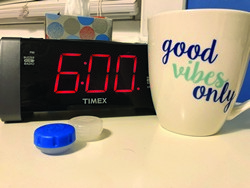“Eating healthy” is a motto many of us hope stand by in our daily eating habits. However, what exactly is “healthy”? Healthy to some is not healthy to all. This description of ideal food habits is a vague idea that can be confusing, especially to busy, broke college students looking to make the best possible food choices. Often, some foods are generally thought of as good for you but really are not. Luckily, with a little research and willpower, these common health food myths can be debunked.
A diet trending right now is gluten-free. People with celiac disease need these foods, but choosing this diet when you do not need to is not smart. Gluten-free foods are not beneficial and actually decrease our nutrient intake as the products are highly refined amalgams of grains and sugar. In comparison to regular bread, gluten-free bread has less antioxidants and fiber.
One food college kids might gravitate towards is yogurt. Be wary though. Light yogurts are marketed as “reduced fat” but the missing fat is really replaced with more sugar. Choose plain or greek yogurt instead. Rachel Fox, a senior English major with an endorsement in special education, said, “I thought light yogurt would save me calories, but then I switched to greek yogurt to stay fuller because of the protein.”
A meat that is usually associated with being lean is turkey. Turkey has become a replacement for pork and beef specialties like bacon, meatballs, sausage. The assumption: if it’s made with turkey, it’s better for you. This is not necessarily true. Amanda Unanski Enright, a nutrition adjunct professor, said, “Most foods made with turkey meat are more highly processed than their non-turkey original counterparts. This involves excess salt, colors, and flavors being added to mimic the original.”
For example, if you are making your weekend breakfast sandwich, you might think swapping turkey bacon over regular is better. In reality, a piece of pork bacon has the same amount of calories, fat, and protein. As for sodium, the turkey bacon contains more.
However, Enright said, “Foods made with minimally processed forms of turkey, such as ground or sliced turkey breast, are considered leaner sources of meat and have lower fat content.”
So, staying away from highly processed turkey is the rule of thumb here.
Fiber and protein bars might seem like a simple “filling” snack on the fly. These bars for the most part are realistically comparable to a candy bar.
According to the Dr. Oz website, an apple and string cheese is a much smarter option than these bars to get your fiber and protein from. Since artificially altered fruits and sugary granola end up in bars, it is better to stick to raw foods.
Jackie Leming, a senior health studies major, said, “I always buy fruits and nuts to keep as a healthy snack.”
Students might opt to get their nutrients from quick, on the go options like smoothies.Calories in these drinks can escalate quickly so watching sugar amounts in your ingredients is wise if you are making them yourself.
Stay away from smoothie chains too, where unnecessary extras like sherbet and artificial flavors are added and one drink alone can total over 500 calories. Think twice if you want a bottled Naked or Odwalla smoothie as well. According to Odwalla’s website, the products contain 47 grams of sugar- not far off from soda.
Chia seeds are often found in these smoothies and another food held high to the health standard. Recently though, according to CommonHealth.org, a man was sent to the ER because of these. Apparently, the seeds can absorb up to 27 times their weight and blocked the man’s esophagus. He ate less than a tablespoon of dry chia seeds proceeded with a glass of water yet this sent him to the hospital. While these superfoods provide benefits like fiber, risks such as this particular instance might outweigh the pluses.
Just because a brand advertises “natural” or “reduced fat,” do not associate that with healthy. The best solution for not falling into these health traps is to become familiar with wholesome ingredients and try to make your own meals as often as possible.
“Cooking during the week doesn’t have to be very time consuming. Many grocery stores are now offering convenience items to help make food prep easier, such as pre-washed salads, precut veggies, and prepared foods like Rotisserie chicken,” Enright said.
Even a simple swap from your normal product to a tweaked version are helpful if you are unsure how to make diet changes. “I use calorie free cooking spray instead of butter or oil when I cook in the frying pan.” Leming said.
Being in college, it is especially easy to fall for these so-called “healthy” products. These foods should not just seem healthy, they must be healthy.


